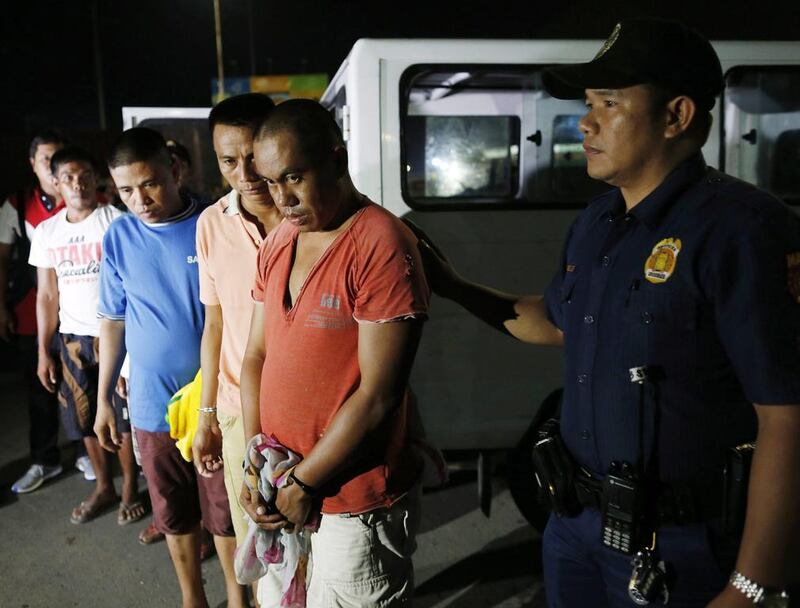MANILA, Philippines // The bodies of dozens of suspected drug peddlers have turned up in the Philippines in recent weeks, providing an eerie backdrop to the swearing-in on Thursday of Rodrigo Duterte, who has warned of a bloody presidency in his bid to eradicate crime.
Some of the dead were killed in gunfights with police; others mysteriously turned up on the street. One was dumped with sign: “Don’t follow me or you’ll die next.”
The number of dead bodies found has spiked since Mr Duterte swept the May 9 elections on promises to wipe out crime and corruption within six months. That bold pledge won him huge support but also sparked concerns about vigilante justice and a lack of due process.
Nicknamed “Duterte Harry” after a Clint Eastwood character with little regard for rules, Mr Duterte has said he plans to fulfil his promise despite criticism from human rights advocates and church officials. He has even dared his critics to impeach him.
"If I couldn't convince you, I'll have you killed. Just imagine if I kill 10 persons a day for the next six years," he was quoted as saying by Cebu Daily News in his native Visayan language, referring to drug suspects. "If you're into drugs, I'm sorry. I'll have to apologise to your family because you'll surely get killed."
Hundreds of drug pushers and addicts have surrendered to police in recent days, signing pledges to reform.
National police data show 39 mostly drug peddler suspects were killed since the start of the year until the election. Since then, 72 have been killed, bringing the total so far this year to 111 deaths.
But outgoing national police chief Ricardo Marquez said that so far this year, 183 have been killed in clashes between police and clandestine drug lab workers, dealers and users. The reason for the discrepancy was not clear.
He dismissed speculation that the spike in deaths was timed to the beginning of Mr Duterte’s presidency, saying he already promised an intensified anti-drug campaign when he took over last year. “There is no truth to what is being said that it is only now that the police have stepped up the fight against drugs,” he said.
In one television report, a mother wailed as she saw the body of her son sprawled on a roadside in eastern Camarines Sur province, apparently shot with four wounds and a slash on his neck.
“What they have done is too much,” she said, sobbing on the shoulder of another woman.
Nearly 5,000 suspects have been arrested in anti-drug operations after the election, bringing the number of arrests in a nationwide drive to nearly 19,000 since January, according to police records. “We are alarmed about the rate of almost everyday killings of suspected criminals and members of drug syndicates,” said Wilnor Montilla Papa, a human rights campaigner for Amnesty International in the Philippines. “Our concern is on the lack of due process, the seemingly abusive stance” of authorities.
Last week, the head of the influential Catholic Bishops’ Conference of the Philippines said the group was disturbed by reports of growing numbers of drug suspects being killed and the spike in vigilante killings. “To kill a suspect outright, no matter how much surveillance work may have antecedently been done on the suspect, is not morally justified,” Archbishop Socrates Villegas said.
Others praised Mr Duterte’s drastic approach to combating crime.
Arsenio Evangelista, whose son was kidnapped and killed 5 years ago, supports the incoming president’s plan to restore the death penalty and promise to eradicate all major crimes, especially drug-related offences in three to six months. But he said the recent increase in drug dealer deaths could not have been on orders of Mr Duterte because he is not in office yet.
Mr Evangelista, who is also a spokesman for a group called Volunteers Against Crime and Corruption, said his group believes the deaths could be part of an effort by police officials to burnish their accomplishments in the face of Mr Duterte’s plans to revamp the police force. Under pressure to step up efforts, police have clamped down on mostly small-time drug pushers who are easier to find and apprehend, he added.
* Associated Press





